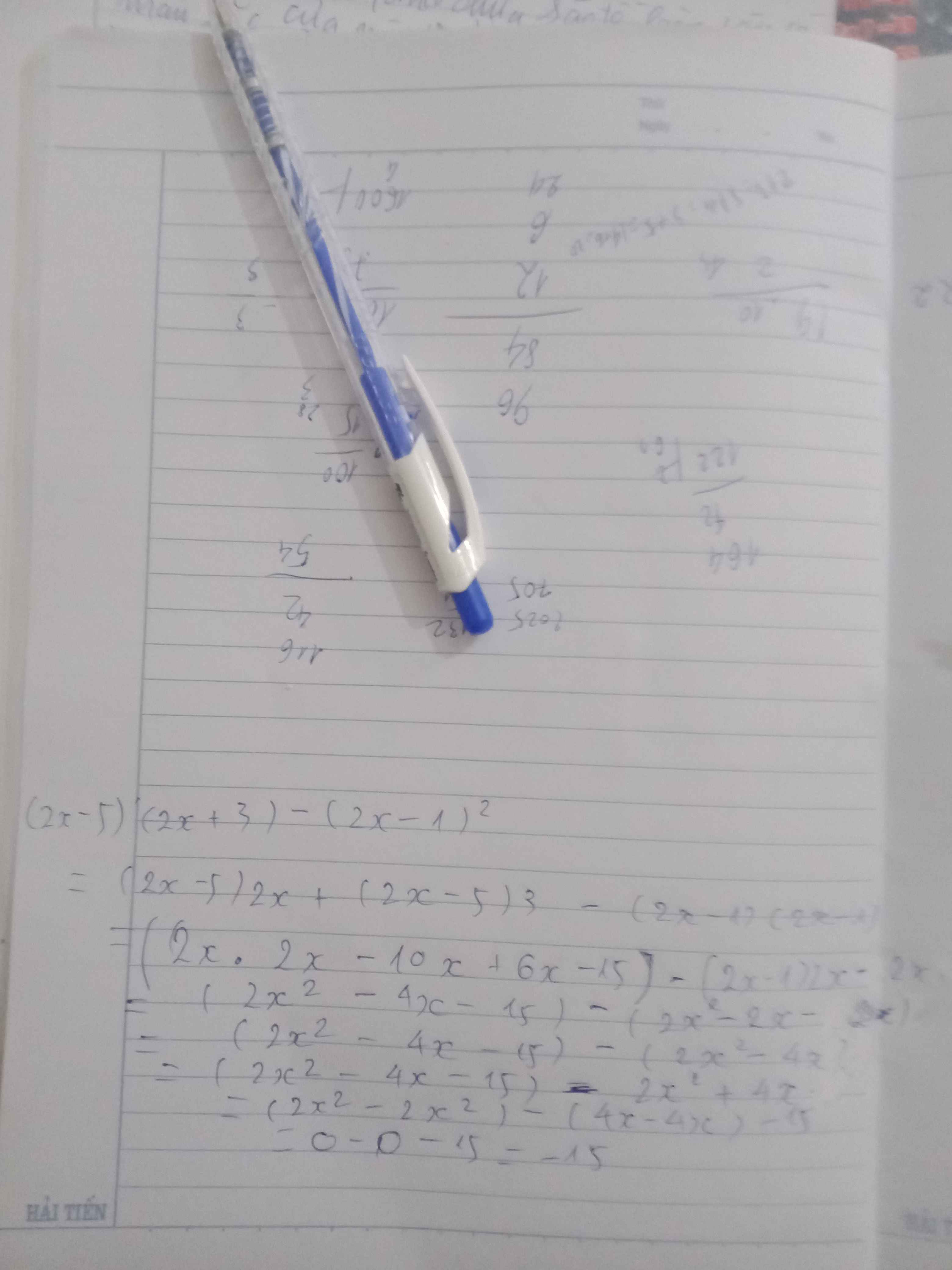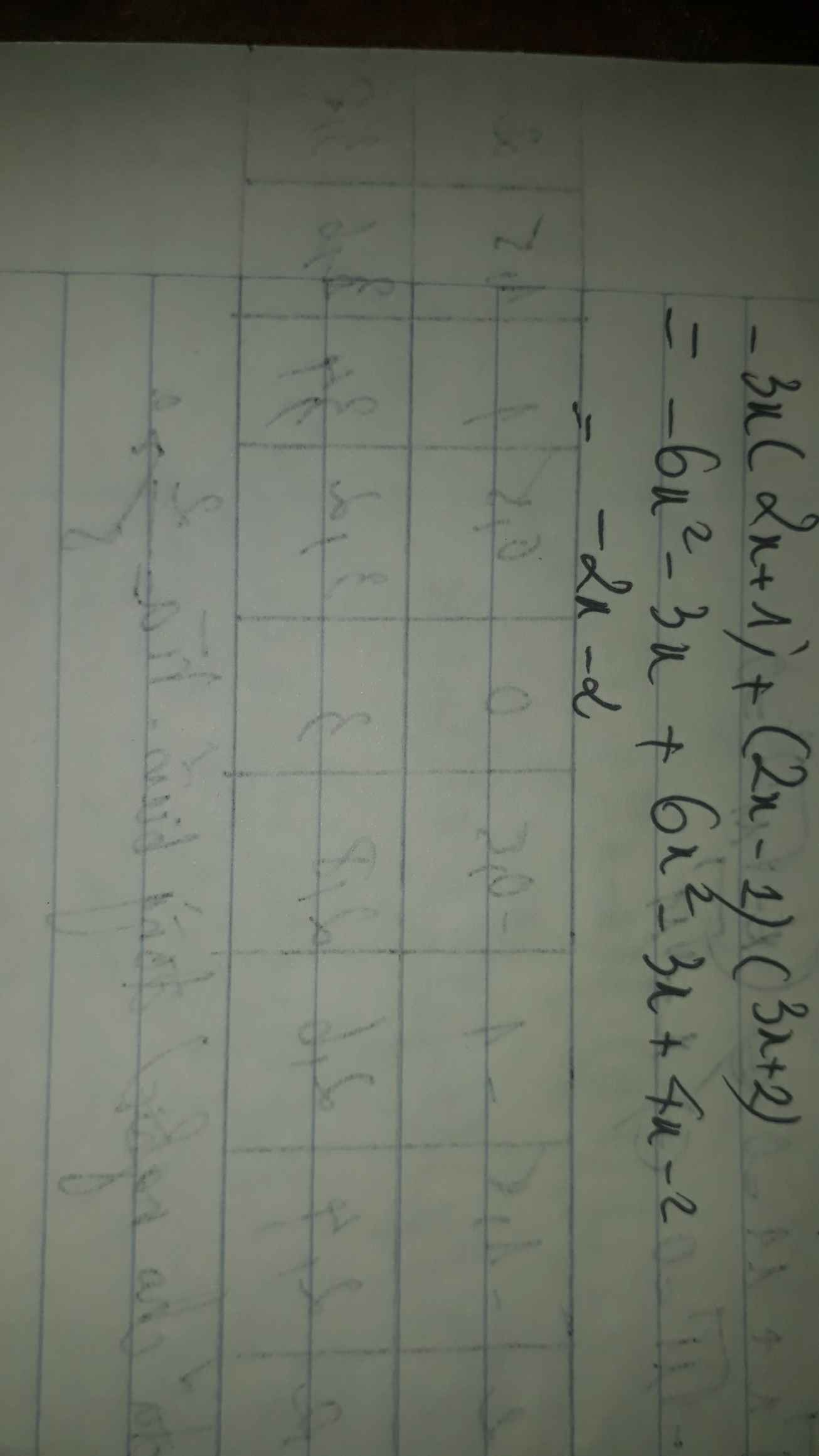
Hãy nhập câu hỏi của bạn vào đây, nếu là tài khoản VIP, bạn sẽ được ưu tiên trả lời.



`-3x(2x+1)+(2x-1)(3x+2)`
`=-6x^2-3x+6x^2+4x-3x-2`
`=(6x^2-6x^2)+(4x-3x-3x)-2`
`=-2x-2`

Ta có: \(-3x\left(2x+1\right)+\left(2x-1\right)\left(3x+2\right)\)
\(=-6x^2-3x+6x^2+4x-3x-2\)
\(=-2x-2\)

\(A=2x^2\left(3x+4\right)\left(3x-4\right)-\dfrac{9}{2}\left(2x^2+1\right)\left(2x^2-1\right)\)
\(=2x^2\left(9x^2-16\right)-\dfrac{9}{2}\left(4x^4-1\right)\)
\(18x^4-32x^2-18x^4+\dfrac{9}{2}\\ =-32x^2+\dfrac{9}{2}\)
Ta có: \(A=2x^2\left(3x+4\right)\left(3x-4\right)-\dfrac{9}{2}\left(2x^2+1\right)\left(2x^2-1\right)\)
\(=2x^2\left(9x^2-16\right)-\dfrac{9}{2}\left(4x^4-1\right)\)
\(=18x^4-36x^2-18x^4+\dfrac{9}{2}\)
\(=-36x^2+\dfrac{9}{2}\)

Ta có: \(2x\left(3x-1\right)-\left(2x+1\right)\left(x-3\right)\)
\(=6x^2-2x-\left(2x^2-6x+x-3\right)\)
\(=6x^2-2x-2x^2+5x+3\)
\(=4x^2+3x+3\)
Ta có: \(3\left(x^2-2x\right)-\left(4x+2\right)\left(x-1\right)\)
\(=3x^2-6x-\left(4x^2-4x+2x-2\right)\)
\(=3x^2-6x-4x^2+2x+2\)
\(=-x^2-4x+2\)
\(2x\left(3x-1\right)-\left(2x+1\right)\left(x-3\right)=6x^2-2x-2x^2+5x+3=4x^2+3x+3\)
\(3\left(x^2-2x\right)-\left(4x+2\right)\left(x-1\right)=3x^2-6x-4x^2+2x-2=-x^2-4x-2\)

(2x+1)*(2x-1)-(3x+1)2-(3x-2)*(5-2x)
=4x2-1-(9x2+6x+1)-(15x-6x2-10+4x)
=4x2-1-9x2-6x-1-15x+6x2+10-4x
=x2-25x+8


(2x - 1)² + 2x
= 4x² - 4x + 1 + 2x
= 4x² - 2x + 1
Để rút gọn biểu thức (2x - 1)^2 + 2x, ta sẽ thực hiện các bước sau:
1. Mở ngoặc bằng cách nhân (2x - 1) với chính nó:
(2x - 1)^2 = (2x - 1)(2x - 1) = 4x^2 - 2x - 2x + 1 = 4x^2 - 4x + 1
2. Kết hợp các thành phần tương tự:
(2x - 1)^2 + 2x = 4x^2 - 4x + 1 + 2x = 4x^2 - 2x + 1
Vậy, biểu thức đã được rút gọn thành 4x^2 - 2x + 1.